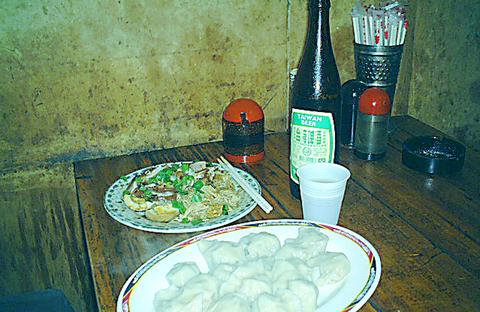In 1969, Chiang Yi-chang (姜宜璋) stoked up a fire outside a storage shed off Linsen South Road and started cooking dumplings. Three decades later his dumpling joint is still in the same shed with its timber rafters, homemade wooden tables and wood-plank floor. The only difference is that now it's Chiang's son who's cooking the dumplings.
"I've had to change out the stools several times. Other than that most everything is the same now as it was then," the elder Chiang says of the decor. He's not exaggerating. The walls have never seen paint. The sole attempt at decoration consists of several large, smoke-stained calligraphy pieces with customers' scribblings on the particle board between them: "Roger & Donna `89. We Love Taiwan!"
Roger and Donna probably loved their meal, too. Chiang has stayed in business so long because his pork dumplings are among the best you can find anywhere in the city and likely much further afield. Ask any older resident of the city and they're likely familiar with Chiang's dumpling joint. The number of people waiting outside for a table during peak dinner hours is a testament to just how good the food is -- and not just the dumplings, perhaps the best part of the meal is the requisite plate of tsai: sliced beef or pork, tea eggs, tofu, pigs ears, bamboo sprouts and other items of your choice piled high and covered with chopped onions.

PHOTO: DAVID MOMPHARD, TAIPEI TIMES
The menu on the front wall also lists various soups and noodles, and while the noodles are quite tasty, ordering them is like ordering chicken in a steak house; this place is about the dumplings.
"There's nothing special about my dumplings," Chiang insists, "I've just been making them so long I finally got good at it. The food I make is the food I grew up eating in Qingdao. Maybe people like it because it's different."
Coke is recommended to wash down your dumplings and tsai. It's served in the tall recyclable bottles that are rarely seen any more. "I think we're the only place in Taipei that still recycles Coca Cola bottles," Chiang says. Taiwan and Asahi beers are also in plentiful supply.
Among the few things that are new is a remodeled bathroom. It previously had a wood-plank floor that began rotting long ago but has recently been tiled and tidied into something usable. "Restaurants never had restrooms in Qingdao so I never gave it much thought," Chiang said. "But now my wife is happy with it."
Chiang's grown son has been minding the shop for several years now and promises to keep the doors open for another generation. The shed he inherited has become an institution in the city, he says. "Everyone I've ever met in my life, I've met in this shed. I could hardly walk away from it.

On April 26, The Lancet published a letter from two doctors at Taichung-based China Medical University Hospital (CMUH) warning that “Taiwan’s Health Care System is on the Brink of Collapse.” The authors said that “Years of policy inaction and mismanagement of resources have led to the National Health Insurance system operating under unsustainable conditions.” The pushback was immediate. Errors in the paper were quickly identified and publicized, to discredit the authors (the hospital apologized). CNA reported that CMUH said the letter described Taiwan in 2021 as having 62 nurses per 10,000 people, when the correct number was 78 nurses per 10,000

As we live longer, our risk of cognitive impairment is increasing. How can we delay the onset of symptoms? Do we have to give up every indulgence or can small changes make a difference? We asked neurologists for tips on how to keep our brains healthy for life. TAKE CARE OF YOUR HEALTH “All of the sensible things that apply to bodily health apply to brain health,” says Suzanne O’Sullivan, a consultant in neurology at the National Hospital for Neurology and Neurosurgery in London, and the author of The Age of Diagnosis. “When you’re 20, you can get away with absolute

May 5 to May 11 What started out as friction between Taiwanese students at Taichung First High School and a Japanese head cook escalated dramatically over the first two weeks of May 1927. It began on April 30 when the cook’s wife knew that lotus starch used in that night’s dinner had rat feces in it, but failed to inform staff until the meal was already prepared. The students believed that her silence was intentional, and filed a complaint. The school’s Japanese administrators sided with the cook’s family, dismissing the students as troublemakers and clamping down on their freedoms — with

As Donald Trump’s executive order in March led to the shuttering of Voice of America (VOA) — the global broadcaster whose roots date back to the fight against Nazi propaganda — he quickly attracted support from figures not used to aligning themselves with any US administration. Trump had ordered the US Agency for Global Media, the federal agency that funds VOA and other groups promoting independent journalism overseas, to be “eliminated to the maximum extent consistent with applicable law.” The decision suddenly halted programming in 49 languages to more than 425 million people. In Moscow, Margarita Simonyan, the hardline editor-in-chief of the